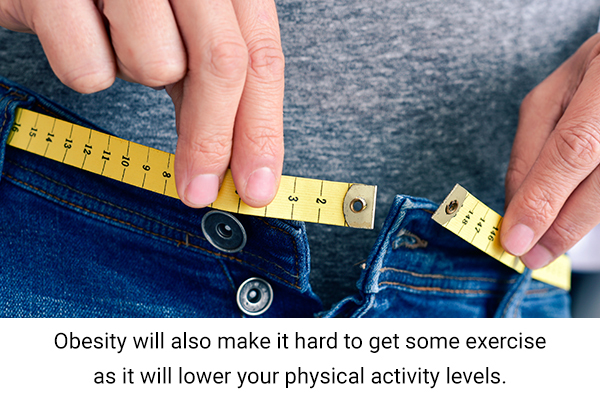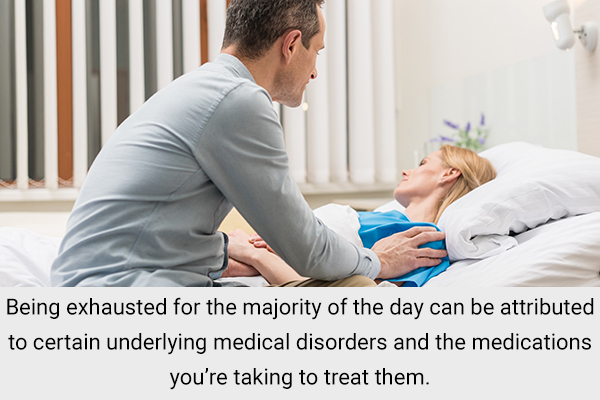In this article:
There are days when you feel tired because of either working too much or not getting enough rest. But if this condition continues for a long time, the quality of your life can be affected and you may end up wondering to yourself why are you always tired and have no energy.

There are signals that can tell you that you are already very tired and need some time for yourself. These signs can include:
- Droopy eyelids
- Yawning
- Lethargy
- Low energy levels
Sometimes, getting good sleep may is not enough or not the required fix, such as when you have an underlying disorder that can wear you off of your energy or you are recovering from an accident, surgery, or any disease that can cause you to feel tired.
Moreover, just stress from daily living and performing day-to-day things can lead to mental and physical exhaustion. This can make you feel very tired and under the weather. (1)
Why You Are Tired and What to Do
Here are some reasons you may feel tired and how to fix them:
1. Lack of physical activity
It is not a hidden secret that if you are physically inactive, you may feel tired every now and then. Regular exercising is very important to stay energetic and away from any kind of fatigue.
Studies have shown that exercising regularly, even a little, can keep you energized and prepare you for a day full of activities. Doing a low-intensity workout can even reduce fatigue.
Not only this, but performing exercises regularly will boost your endurance and strength. This will be very good for your heart health and will increase oxygen delivery to your cells and tissues. (2)
Exercising is also good for ensuring a good night’s sleep, which is necessary for not feeling lethargic or fatigued the next day. Therefore, exercising is a very simple and inexpensive thing you can do for a healthy body.
How to incorporate physical activity into your routine: (3)
- Do aerobic exercise for at least 15 minutes every day. This can include walking, jogging, or swimming.
- Exercise with your friends or form an exercise group to motivate each other every day.
- Do not sit or stand in the same position for long durations. Take walking or stretching breaks in between.
- Making small important choices such as taking the stairs instead of the elevator is good for improving your health.
- Do house chores such as cleaning up and gardening to get some physical activity in.
- Doing outdoor activities such as group sports is also a great way to ensure you’re physically active and having fun at the same time.
2. Not drinking enough water

Dehydration has been linked to making you feel exhausted and easily tired. Not drinking enough fluid can be linked to lethargy. Proper fluid intake is very important to ensure that you are ready for the day and your energy levels are up and going.
Dehydration is bad for your brain as it lowers the oxygen supply to the nervous system. It can also lower your blood pressure and cause hypotension, which can further lead to you feeling tired.
Dehydration can also lead to troubles in mental health as it can make you moody. The list doesn’t stop, poor fluid intake may also lead to weakening of the muscles and difficulty concentrating. (4)(5)
How to ensure proper fluid intake: (6)
- Keep a water container with you throughout the day and sip water every now and then.
- Consume fluids before and after your exercise routine.
- It is important to drink a fluid that is rich in electrolytes.
- Eating fruits and vegetables such as watermelon, tomatoes, and leafy greens that have high water content is also a good idea.
- Make sure you only drink healthy fluids and beverages and not those that are rich in sugar such as sodas and flavored coffee.
3. Not sleeping enough
Your sleep quality can have a huge influence on your quality of life. Not sleeping enough or having poor sleep quality can make you feel tired and lethargic.
Even a day of little to no sleep will influence your mood and have a negative impact on your overall wellness.
According to a study, sleep deprivation has a negative effect on your cognitive performance and motor functioning. (7)
How to get quality sleep: (8)
- Follow a sleep schedule. You should sleep and wake up at the same time.
- Taking a quick nap in the afternoon for a few minutes to re-energize is also a good idea.
- Try not to mess up your schedule on the weekend by staying up late, and sleep on time as much as possible.
- Do not use your electronic devices, especially your phone, before bed as they can hamper your sleep quality.
- Do not consume alcohol or smoke before you go to sleep.
- Relaxing every night to calm yourself down by meditating is a good option.
4. Weight gain

A sedentary lifestyle leads you to obesity, which further will compromise your energy levels. Being overweight leads to you feeling exhausted for the entire day.
Obesity will also make it hard to get some exercise in as it will lower your physical activity levels.
Furthermore, not having a healthy weight can keep you up at night from sleep apnea and restlessness. This will make you feel lethargic and sleepy the next morning. It can also cause heavy snoring. (9)
How to maintain a healthy weight:
- Exercise daily to lose weight and maintain good health.
- Eat the right foods and follow a good healthy diet.
- Take part in more outdoor activities.
- Do not eat processed food.
- Cut down on sugary beverages.
- Limit caffeine and alcohol.
- Stay mentally fit with meditation and de-stressing activities.
5. Lack of nutrients
Feeling tired can also be because of a poor diet as it can cause nutritional deficiencies in your body. A healthy diet is very important to not feel weak or lethargic and to stay away from fatigue.
Important nutrients to include in your diet are: (10)
- Magnesium
- Iron
- Vitamin C
- Vitamin B
- Copper
How to ensure proper intake of nutrients:
- Eat a lot of fruits and vegetables daily.
- Follow a diet chart as per your requirement.
- Seek help from a professional nutritionist who will help you get on the right diet.
- Take supplements after medical advice if required.
6. Underlying medical diseases

Being exhausted for the majority of the day can also be attributed to certain underlying medical disorders and the medications you’re taking to treat them. These conditions can include: (11)
- Acute liver failure
- Anemia
- Anxiety
- Concussion
- Diabetes
- Fibromyalgia
- Heart issues
- Cancer
- Sleep apnea
- Multiple sclerosis
How to manage your health:
It is important to go for regular health checkups to detect health issues and treat them before they lead to more serious conditions. Such escalations and the negative impact they can have on your life can be resolved if you are on top of your health and treat any disorders timely.
Managing chronic illnesses is also key to living an active lifestyle. (12)
7. Stress
Stress has been linked to feelings of lethargy and tiredness. Prolonged stress can not only cause fatigue but also disrupt your sleep cycle, which will further lower your energy levels for the day.
Stress can come from home, relationships, work, or any other field in life. It is best that you learn how to de-stress and sail through tough times without compromising your health and wellness. (13)
How to deal with stress: (14)
- Take out time to meditate.
- When stress takes over, start deep breathing or performing breathing exercises.
- Do regular physical activity.
- Avoid excessive alcohol or substance use.
- Talk it out with a friend
- Do relaxing activities such as journaling or crafts.
- Listen to soothing music.
- Spend some time outdoors.
Most-Asked Questions
How much water should I drink in a day?

Men should drink around 15 cups or 3 L of water every day and women should consume 11 cups or 2.2 L of water daily. (15)
How much sleep should I get every night?
Both men and women must sleep for at least 7 hours every night. A sleep duration of 7–9 hours is considered good enough to feel your best and fresh every day. (16)
What foods should I eat to get enough magnesium?
Magnesium is required for energy production in the body. Foods rich in magnesium include: (17)
- Green leafy vegetables
- Nuts
- Seeds
- Fish
- Beans
- Yogurt
- Banana
- Avocado
- Dark chocolate
Can lack of iron cause tiredness?
Iron deficiency is linked with anemia, a condition where you have low hemoglobin levels. This will lower your oxygen supply to the cells and tissues of your body, causing you to fatigue easily. (18)
What foods are rich in iron?
Foods rich in iron include: (19)
- Red meat
- Poultry
- Seafood
- Beans
- Raisins
- Lentils
- Apricots
- Pasta
- Bread
Is vitamin C important for staying energized?

Yes, vitamin C is a must-have if you need to stay energized throughout the day. Food rich in vitamin C include: (20)
- Papayas
- Strawberries
- Oranges
- Kiwi
- Cauliflower
- Broccoli
- Red bell peppers
How to stay energized during pregnancy?
- Rest as much as possible whenever you feel too tired or worn out.
- Exercise for a few minutes every day. Start by walking for 15 minutes every day.
- Get more sleep during the first and last trimesters.
- Take your supplements, if you have any, on time.
How to fight lethargy after menopause?
- Sleep in a cool dark room for good relaxation after menopause.
- Eat a healthy diet and have smaller meals. Avoid huge portion sizes.
- Avoid eating too close to your bedtime.
- Limit your intake of caffeine and alcohol.
- Try to de-stress with yoga, meditation, and acupuncture.
- Exercise regularly to stay upbeat.
Final Word
Staying energized throughout the day is very important to ensure you get all your work in while living a good quality of life. It ensures a balance between everything as you keep on top of your stuff and lead through the day happily.
Feeling tired every now and then is normal, but staying in this state of fatigue for a long time can mean something serious. Seek medical help if you feel you’ve been feeling tired for more than a few days now.
- Was this article helpful?
- YES, THANKS!NOT REALLY


